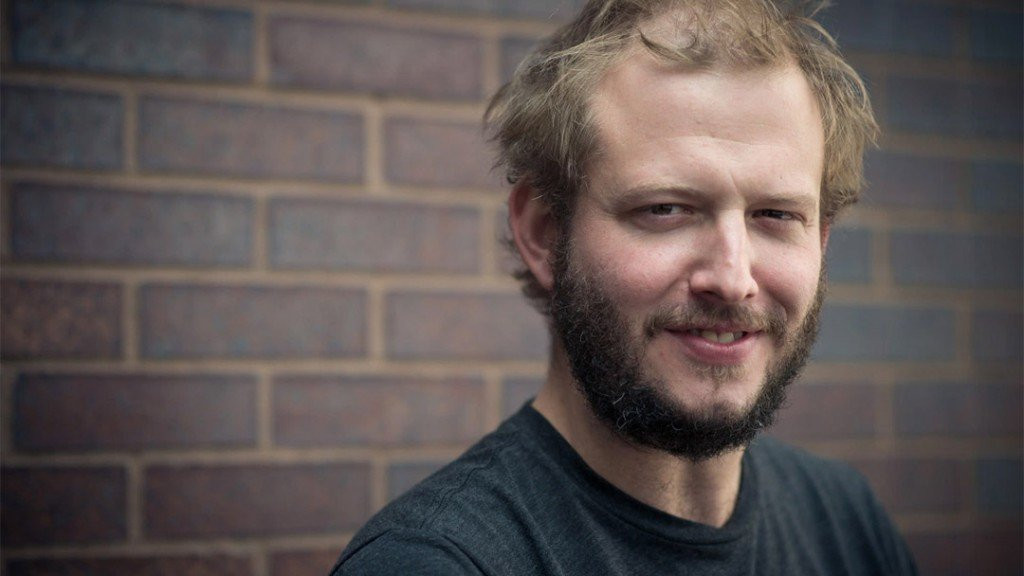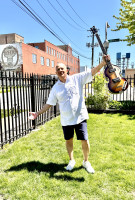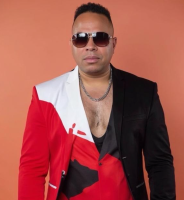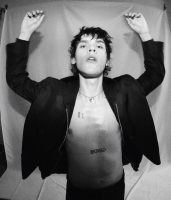Justin Vernon lights a blunt as he charges his Tesla, which is affectionately named John Teshla. When John’s batteries are full, we cruise around rural Eau Claire County, a sparsely populated area of Wisconsin where Vernon was born and raised and still resides, listening to a Grateful Dead bootleg from 1977. The hippie godfathers have been an outsized influence on the 38-year-old as of late, if not musically, then spiritually and psychedelically. LSD and DMT are more prominent in his life now, drugs whose therapeutic and creative properties Vernon champions. He has started to ask the crowd at Bon Iver shows if anyone’s on acid. One time, when no one raised their hand right away, he raised his own.
We crest hills on empty roads with names like County Road HH, from which, on this unconditional August day, you can see a highway cut through the treeline on the horizon. The city of Eau Claire, population 65,883, is split by the Chippewa River, leaving an oxbow lake just across from its state school, where Vernon once majored in religion and women’s studies. He loves it out here, surrounded by rolling green fields of soybeans and corn stalks, where time seems to be meaningless.
There are few American artists who have invested so much of their time and money to put their backwater hometown on the map—even if the reader’s poll in the local alt-weekly recently decided that Justin Vernon, his local music festival Eaux Claires, and the new downtown performing arts center he has supported are all among the city’s “Most Overrated” attractions. Vernon, ever the chill bro, is unbothered. “I’m riding just as hard for the people who are like, ‘Whoever this guy thinks he is trying to make cool shit happen in his own hometown with his guitar music can get fucked.’ I’m fine.”
He lowers the windows to prove just how quietly John Teshla rides. A left turn, a right, another right, maybe a left, and soon we’re at one of the few intersections in the area he doesn’t recognize. Just then a black bear ambles up onto the road in front of us, and Vernon slows to a stop. The bear takes its time crossing the highway, sniffing the asphalt, looking at us, then lumbering to the opposite side. We sit transfixed as a crunchy Jerry Garcia solo seeps through the speakers. The bear disappears into a field, and Vernon, beaming, lets out a cosmic “fuuuuuuuck.”
Play/Pause Button
Vernon is relaxed these days, a perennially bearded Northwoods Lebowski, full of hell yeahs and yeah babys, who wears old T-shirts, a trucker hat, cotton shorts, and camo Crocs. He’s especially giddy at the moment because the whole Bon Iver family is due to reconvene in town tomorrow for rehearsal, a thought he returns to, apropos of nothing, several times throughout the day.
His band makes up just a fraction of the people who have helped him ascend from coffeeshop standby to an avant-garde pop icon the world over, redefining the genres of folk and indie rock in the process. They are the ones who supported his two Grammy wins, his April Base recording studio, his artist-friendly streaming service, and everything else that has arisen in the wake of Bon Iver’s heartbroken 2007 debut, For Emma, Forever Ago. Their new record, titled i,i, is a conclusion of sorts, the end of a masterful four-album run that has turned Vernon into an unlikely arena-filling star. He wants the world to understand that he alone is not responsible for his success, even though the one thing people might know about him is that he’s the guy who recorded that one album alone in the woods.
“I know I’m going to be Bone Iver forever,” he says, purposely mispronouncing the name in a Southern drawl. “But I’m not doing this to show you about me. I’m doing this to show you about you, or us about us.” This is the albatross around his head, a war with his ego made worse by good weed and a deep Midwestern guilt. Uncomfortable with becoming the focus of this whole project, Justin Vernon would rather disappear completely into the background of Bon Iver. That is the aim of i,i, a deeply collaborative and generous offering to the growing church of Bon Iver, centered around the generational voice of the man who built it.
Bon Iver member Jenn Wasner and tour manager Emily Bragg
Advertisement
While in Eau Claire, Vernon lives in a small house on the outskirts of town, where he keeps company with his two rescue cats, Flo and Melman, and sleeps on a frameless bed in an unfurnished room. The house sits on a property just down the hill from April Base, Vernon’s own version of Bob Dylan’s Big Pink studio in Woodstock, New York. The recording facility is part of a 10-acre estate where musicians can rest in bunk beds, cook food grown in the garden, wander the woods, rehearse, record, shoot hoops, and lounge by an enormous koi pond. (All the fish died recently due to a chemical treatment accident.)
The studio has been part and parcel to Bon Iver’s success through the years, welcoming a wide array of people, from regulars like veteran indie rockers Low all the way to Kanye West, who commandeered the entire property for an entire week in October 2014 while working on The Life of Pablo. A revolving door of musicians came out to the country—from Bon Iver band members to Arcade Fire’s Win Butler, Common, and Kendrick Lamar—building song bites for Kanye to taste. Three-on-three basketball games were played. “It was wild,” Vernon says, matter-of-factly.
Vernon and Kanye have famously developed a strong working and personal relationship throughout the decade. It was Kanye who first ushered Vernon into the greater pop world by featuring him on 2010’s My Beautiful Dark Twisted Fantasy and 2013’s Yeezus. What started as two artists finding mutual inspiration in one another has evolved into the yin and yang of Kanye and Justin. Both wrestle with ego. Both don masks and search wide-eyed for inspiration among a coterie of collaborators. Both staunchly refuse to look back on their past and rest on their laurels. Both are interested in fashion—though unlike Yeezy’s grayscale couture, the historically unkempt Vernon plans to start a company with his lifelong friend, the noise musician Trever Hagen, by purchasing a shipping container full of old clothes and making “weird recycled fashion” with a pair of scissors.
Vernon and Kanye’s idea of how to run a highly collaborative recording session may be the same, but they have drifted apart in their politics. “I can’t really kick it with him anymore on a personal level, just the energy,” Vernon tells me, diplomatically. “But I’ve got mad love for him, and we’re still friends.” As opposed to Kanye’s infamous Trump worship, Vernon is more attracted to the progressive ideologies of Bernie Sanders or Elizabeth Warren.
In October 2020, Vernon wants to route a Bon Iver tour all around Wisconsin—the once and future battleground state that Trump surprisingly won in 2016—doing as many shows as he can in support of the Democractic presidential nominee, whoever that may be. “We will have super-high ticket prices, low production [costs], hopefully the candidate can come out and speak,” he thinks out loud. The plan is for Vernon to personally subsidize his 25-person crew for the entire month, and drum up enough support to “get a bunch of money and give it to the people who need it to run this shit better.” Vernon’s political leanings are consistent with his approach to music: the redistribution of self, discarding the archetype of the lone, tortured artist as just another dogmatic cliché of what good art really is. “Power has come to me,” he tells me, “but it’s not fun to wield by yourself and it’s not as useful if it’s just your vision.”
We walk through the grass on the April Base estate to an aluminum farm shed piled high with racks of Bon Iver gear—at least 30 guitars, a Hofner bass, a few organs, something like seven drum sets, analog synths, an enormous SSL Duality soundboard. Vernon shows me his high school Fender Strat with a “Free Tibet” sticker and a faded “FUGAZI” scrawled on the back of the body in marker. As we leave, he turns around and takes in the enormity of the room, as if halted by the sheer size of what Bon Iver has become: “Holy shit, what are we?”
Play/Pause Button
Bon Iver’s Justin Vernon, Jenn Wasner, Andrew Fitzpatrick, and engineer Lena Sutter at rehearsal
On Vernon’s upper left arm is a tattoo of a woman named Cicely, the namesake of the fictional Alaskan town from the early ’90s TV show “Northern Exposure.” (In the dramedy, neighbors would wish each other a “bon hiver,” French for “good winter,” which is where Vernon got the name of his band.) Sitting at a table covered in peanut shells at his favorite Eau Claire dive bar, a former jazz club called The Joynt, Vernon tells me the show’s story of Cicely: Hoping to bring some culture to a 19th-century frontier settlement, she opened a salon and performed a modern dance for a rowdy audience of roustabouts. The crowd laughed and leered, but all the while she kept dancing, flowy and unfazed, until the audience fell under her spell.
Cicely—the town, the woman, the tattoo—is at the center of the Bon Iver project, the idea of building a fictional haven that lives within the listener. It’s a fanciful bit of storytelling that is of a piece with Vernon’s songwriting. His friends all say that his music is this slow trek to discover who he really is. His impressionistic lyrics, though, make it difficult: fragments of memories jut up against half-thoughts and made-up words like “camodee” and “anoberic” and “fuckified.” Going fishing for meaning in these deep waters, you often come up with some arcane autobiographical moment or a story just a few inches shy of what actually happened.
Which is why I ask Vernon if he fell off a bass boat. I ask the question because one of the lyrics you can really, truly hear on i,i is “I fall off a bass boat.” The short answer is no, the long answer is better.
It involves one night a few years ago when Vernon, a little drunk, was tearing around a frozen lake on an ATV. As he twisted up the throttle of the four-wheeler and turned the handlebars into a fishtail, he lost control and flipped it sidewise, sending his body 15 feet in the air, and his head down hard on the ice. His friend, the musician Ivan Howard, was watching from close by and sprinted as fast as he could on the ice, fearing what seemed like a horrible accident. Miraculously, Vernon walked off with just a little concussion.
Many of his songs have a “bass boat” moment, abstract odes to incidents with friends. Bon Iver would not be here today without Howard, whose indie-pop band the Rosebuds helped inspire Vernon when he was living in Raleigh, North Carolina just before he decamped to his father’s hunting cabin in Wisconsin to record For Emma. This excavation of memory, a transformation from the banal to the cathartic, from one person to many, is the friction that gives life to Bon Iver’s music. But the idea that Justin Vernon is the man responsible for Bon Iver is also what has made writing songs about himself so difficult.
Bon Iver guitarist Andrew Fitzpatrick
There was a pall over the entire process of creating Bon Iver’s last album, 2016’s 22, A Million. The quick acceleration of Vernon’s career had him on the run, and his music likewise took up residence at the ass-end of a galaxy, far away from the warmth of what came before it. 22, A Million was both acid and alkali, like it could fizz up and break apart in your hands. Vernon hid his voice and intention deep within its cryptic numerology and crises of faith, focusing on the dualities of life to make something like the Tao of Justin. “Everything on that record was about closing shit down,” he recalls. “There was a lot of anger in there.”
By the time the album came out in the fall of 2016, Vernon’s anxiety had reached its peak. Depression took hold; at times it felt like he couldn’t breathe. He would have to psych himself up just to walk into a room with people. On top of it all, another breakup.
“Being a Wisconsin boy, you get to drinking, you know?” he tells me in the car, eyes trained on the road in front of us. “I was hanging out on the edge of that stuff a little. Maybe over the edge a few times. More than a few times.” This moment rhymes with the one that famously sent him into seclusion to make music from his misery all those years ago. But instead of retreating into himself to make another miserable-guy-with-an-acoustic-guitar album, he took a couple months off drinking, got into therapy, got on medication, and, as he sings on the new record, “stood a little while within it.”
“It’s so corny,” he tells me, “but you got to love yourself and be calm and happy, because if you don’t do that, you’re going to be angry at the people around you for somehow not giving it to you.” This is the crux of i,i: finding yourself in other people. Incidentally, it’s one of the most personal records of Vernon’s career.
Play/Pause Button
Early this year, feeling healthy and renewed, Vernon moved into Sonic Ranch near El Paso, Texas, a massive recording studio situated on a 2,300-acre pecan orchard. He brought a handful of songs he’d been working on for years, along with the small Bon Iver army. There were his regular players (percussionists Sean Carey and Matt McCaughan, saxophonist Mike Lewis, guitarist Andrew Fitzpatrick) and a team of familiar producers and tinkerers (Chris Messina, BJ Burton, Brad Cook, Rob Moose). There was also a new member, Jenn Wasner, one half of indie rock duo Wye Oak, the first woman to ever join the band in its porous existence.
For six weeks, everyone worked in different little studios, bringing ideas in and out to main rooms, auditioning riffs, futzing with samplers, pedals, gear, and synths until something genuinely surprising emerged. More than ever, Vernon was letting the band dictate the sound of the record: psychedelic and warm, dense and open. Even though there were plenty of false starts and dead ends, Vernon attests, “They’re all seeds—a mood that you can build around. I didn’t want to be worried about being the author of everything, it was more about trying to find something I can cruise on.”
Advertisement
The record presents many vocalists alongside Vernon, including 64-year-old piano man Bruce Hornsby, genre-busting contemporary crooners Moses Sumney and James Blake, rapper Naeem (fka Spank Rock), and the Brooklyn Youth Choir. “There is a certain quality that happens when you have all these different timbres and textures,” says Wasner, who also sings on the album. “It’s a sonic representation of what he was trying to achieve with the project itself. When you get comfortable with yourself, you start to realize the thing that brings meaning to your life is actually other people.”
Even so, Wasner admits that, more than anything, it’s Vernon’s singular voice, a multi-octave tear-jerker rooted in gospel and blues, that holds i,i together. According to Hornsby, who’s worked with everyone from Phil Collins to Elton John, “When Justin starts singing, the air in the room changes and the temperature rises—there’s a heightened sense of possibility all of a sudden.” (Hornsby first heard of Bon Iver eight years ago, when he saw his name popping up in Google alerts that referenced him as an influence on Vernon). Hornsby’s own voice is featured on “U (Man Like),” a halting piano fanfare the veteran songwriter originally composed for a Spike Lee movie that was refashioned as an examination of toxic masculinity. It’s one of several songs on the album that look closely at the prickly topics of our era in a prayerful—but not preachy—way.
An uneasy feeling settled over the band as they worked to build these songs from their skeletons in the late Texas winter. The border between the United States and Mexico was just a few hundred yards away from the studio, and an immigration detention center was close by. News of the president declaring a national emergency to secure funding for his wall trickled in through errant push alerts on their phones. The band would watch birds fly back and forth over a small wall that abutted the property, noting the utter meaninglessness of such a barrier.
Vernon tells me he started sketching out i,i’s penultimate track, “Sh’diah” (an acronym for “shittiest day in American history”), the morning after the 2016 election, and the final version sounds like a weary exhale. Then there’s the album’s bitterest moment, “We,” a kiss-off pointed at those who haven’t figured out that Trump “is not what you’ve been sold.” “If you could drop an MDMA cloud on the White House, just maybe he would have empathy,” Vernon tells me. “But we don’t want to make the mistake of sending all our energy to this one guy. He’s just a metaphor. He’s a black hole.”
The impetus to confront the doom of the future alone led Vernon to realize that the anxiety about existential crises like climate change, misogyny, and Trump can be better faced as a group. “It’s not about having fear and anguish,” he says of i,i as we park the Tesla and sit on a park bench, across a small lake from the hospital where he was born, and within earshot of a chainsaw sculpture competition. “It’s about trying to talk about it, take action, and literally help everyone else understand how important it is, because you can’t do shit on your own.”
The next day, the rest of the band and crew meet up for drinks inside The Oxbow, a boutique Eau Claire hotel of which Vernon is a part owner. Each new person that comes through is another weight lifted off of Vernon’s chest. It is a reunion that has happened many times before, in Lisbon and France and Wyoming—the tight-knight Bon Iver crew rallying back around each other for another road trip, this time for their first-ever arena tour.
In four days, Bon Iver will release i,i, but in my entire time in Eau Claire, Vernon never once talked about the album coming out, or what he hoped people thought about it. He wasn’t nervous, self-conscious, or uncertain. Vernon and his squad seem more excited about resuming their Dungeons & Dragons campaign, or using the mobile studio set-up where the six-piece band can workshop and record new sketches as they rehearse and travel. As several people attest, the mood and morale at Bon Iver HQ is off the charts.
In the hotel bar, everyone gets to drinking, and the conversation spins out over hours: Vernon asks Wasner if she remembers the “insane” 40-minute jam session they did at Sonic Ranch, which he submitted to be used in a new movie trailer (it didn’t make it). Vernon and Fitz, the guitarist, recall their time taking acid backstage at a Dead & Company show, where Vernon joined John Mayer and the band for a song. (“I am fully in on John Mayer,” Vernon says. “Hats off to that motherfucker.”)
Rehearsal is set to continue the following morning, but the night feels endless with this renewal of fellowship. “I’m so excited right now,” Vernon says at the bar to no one in particular. “We only have band practice for two-and-a-half fucking weeks. That’s all we have to do.” The band orders an enormous Scandinavian board of charcuterie with trout spread, aged Wisconsin cheddar, and cheese curds. Eventually, inevitably, John Teshla is hotboxed.





